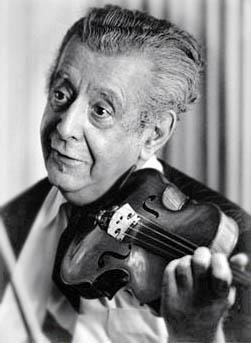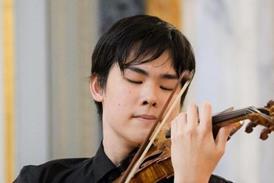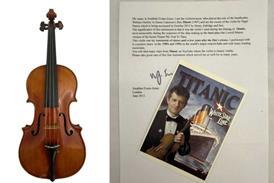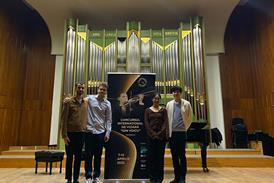You weren't aware of him or of yourself. The focus was entirely on what you were doing'

In the March issue of The Strad, violin teacher Pauline Scott,
recently retired from Guildhall School of Music and Drama in
London, answers questions on her techniques for our Ask the Teacher
feature. When we interviewed her she also remembered the patience
and discipline she received from the legendary pedagogue Ivan
Galamian
‘I studied with Galamian for five years. I auditioned and hadn’t a
clue what I was getting into, but when he heard me he said, “You’re
very musical, but you have no technique.” I said “I know.” Before
then I’d done everything instinctively – I started quite late, at
eleven, and had no musical background. I did a lot of quartets at
college, but my playing was intuitive and that’s when you start
having problems.
When I went to Galamian, at Juilliard, the atmosphere in New York
was so energised – nobody needed to tell you to practise. I started
with scales and Kreutzer studies and spent two months on that. He
was insistent about bowing technique. In England at that time there
was a lot done on the left hand but not so much on the bowing arm.
I was getting very tight so we started at square one.
To begin with I didn’t know what was happening; I just did what he
said. We had a lot of scales. It wasn’t a question of having to be
complex or fancy or fast: it was all about listening to the sound,
organising the bow, the importance of the contact between the
bowing arm, the bow and the string. So many people play with a lot
of pressure, which kills the sound. His priority was to develop
what he called “the springs”, in order to become more sensitive and
aware of the actual contact of the bow on the string, to get the
best resonance. It wasn’t a question of loud or soft: it had to be
like a bell – you had to get that clarity. A lot of it was the
balance of the arm, using weight rather than pressure – pressure
can be added. You had to know what you were doing and have absolute
control over the sound so you could play lyrically and legato
without bulging. So much of the work was about getting this mastery
of the tonal quality, being in control mentally. He’d spend a long
time on things. Nothing was short term.
His teaching was methodical: his principles were logical and
simple, but the execution took a lot of painstaking work. His
patience was amazing: he was in no hurry. You might practise very
hard, but you would be on something as long as it took to do what
he felt was needed. The other thing that struck me was that he
wasn’t a ‘personality’. You weren’t aware of him or of yourself.
The focus was entirely on what you were doing. Usually you’re very
aware of a teacher’s presence, but with him it was pure focus. It
was a long procedure of being mentally focused and calm, but
intense – a balance of having time but working mentally.
He’d ask for Bach every lesson, because Bach has to have perfect
intonation, rhythmic stability and a sense of construction, which
needs a lot of discipline and work. We went through all the
studies, from Kreutzer to Paganini, every single one, and mainly
concerto repertoire more than sonata repertoire. You always knew
Galamian was supporting you. I worked very hard: I was so motivated
that there was no stopping me, even when I didn’t know what I was
doing. And gradually I understood what was happening.
Later I got to know Galamian well and he and his wife were very
kind to me, but in a lesson you’d go in and you’d not waste one
second. There was hardly any conversation and yet he knew all about
one. He knew my character intuitively. Everything he did was
unspectacular. He’d teach every day, seven days a week, 8am until
6pm, apart from Christmas Day, and we’d have a party on New Year’s
Day. It was all about consistency. He was kind to everyone, but if
one was not totally committed he wasn’t bothered. I remember one
concert where someone was playing Chausson, but Galamian was
furious because the player didn’t play how Galamian had indicated,
and you had to do it the way he wanted. Rubato, fingering – his
argument was, “You do it my way and then you can do it how you
want.” Whatever he wanted, it was for a reason, so one learnt. This
wouldn’t go down very well these days but it was good
discipline.
He wasn’t a very exciting player himself, but he knew the
repertoire off by heart – all the studies and concertos. He could
play everything, but he wasn’t an inspirational performer. He was a
practical man: he wasn’t interested in histrionics. And yet, the
talent of the people who were there at the time was incredible –
Itzhak Perlman, Pinchas Zukerman, Kyung Wha Chung. The first time I
got to know them all was in Meadowmount in 1965. Hearing those
people could have put you off, but I found it so exciting. In the
UK at that time there weren’t really great players. The people one
admired were of a different generation and this was the first time
the violinists I admired were my age. I would never be a Zukerman
or a Perlman, but it inspired me. The whole atmosphere was of
rigour and great joy. There was no reason not to play those
virtuoso pieces – it was just a question of application. When you
see all that happening and you watch the sheer energy and work you
think, “Why not?”, which is wonderful.
































No comments yet